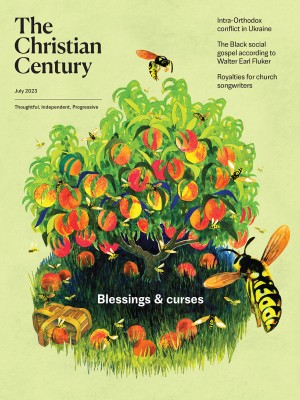“Who hopes for what is seen?” asks Paul. Me. I do. I did, anyway.
I expressed my hope with the same clichés everyone else did. I reached for something hope-related whenever the subject of a conversation was unpalatable and I did not want to bring anyone down with real life. “Don’t let it bother you too much,” I would say. Why? Because “there’s always hope, right?” It was what I said whenever I didn’t want to become encumbered by the overwhelming injustices and tragedies of our world. And because of my social location, that was possible. I didn’t have to see it if I didn’t want to. I could put the hope Band-Aid on whatever the problem was and go about my life unscathed.
But in March 2020, and for two years following, injustices and tragedies collided. When both the proportion and proximity of the collision exposed the inadequacy of my hope, I wrote this is my online journal:
Hope isn’t something I find, or stumble upon. Hope is the act of walking itself. It’s the determination fueling the search for joy, the dogged pursuit of something other than what I already know. It’s the belief in something that defies definition. I don’t know where its edges are, and it has no ergonomically purposed handles. But I still have to hold on to it, even though it’s slippery and misshapen and my grip is faltering. Whatever keeps me trying, that’s hope.
Read our latest issue or browse back issues.
When the women went to the tomb that morning, hope wasn’t what they came with. They came to find what they left two days before, a tomb with a dead man. But when they got there and it wasn’t as they expected, hope was whatever pushed past their terror and opened the door of their minds and hearts to wonder, imagine, accept, and proclaim something completely beyond their conceptions. Hope buoyed them against debilitating embarrassment as they spoke the Ridiculous to their grieving siblings.
My whole life I’ve described God as the ultimate spirit-life-breath-force and ever-abiding presence. So what am I to do with a worldwide plague of literal breathlessness and crushing loneliness? Who is this God I’ve spoken and clung to for so long? A fantasy? A divine stuffed toy to bring comfort when there is none?
Maybe hope is just a pretty word for theological stubbornness. Fine. But as I live and breathe, it is what can’t give up on God or love or good in precisely the moment that that’s the only reasonable thing to do.
With that admission, I relieved myself of any hope for a happy ending. It was dishonest to look at what was happening all around me, around all of us, in April 2020 and say with any integrity, “This will get better” or “There’s some divine purpose in this.” We were in the grip of a worldwide pandemic, the likes of which no living generation had ever experienced. The horrors of racism were everywhere. The steady diet of death, violence, and isolation changed me. It changed us. I could see it happening, and no one could offer any kind of truthful reassurance about it. The illusory hope of my youth was not up to the task of that moment or any moment since.
Ethicist Miguel A. De La Torre has written extensively about hope and hopelessness from a liberationist perspective. He argues that the church must seek our self-definition based not on what we can achieve (the happy ending) or what we believe (doctrine) but on how we behave (praxis) as followers and imitators of Jesus. Day in and day out, the only questions that matter are these: Are we living in solidarity with the least of these, or are we benefiting from their exploitation? Are we on the side of liberation or oppression? To be on the side of liberation, he advocates for “embracing hopelessness” rather than offering disingenuous words of assurance to oppressed people.
“I don’t hope in English, I hope in Spanish,” he said at Biola University in 2019. Esperanza, the Spanish word for hope, is related to the verb “to wait.” “We Latinos realize that to esperar . . . means that we’re waiting, but we’re not sure what we’re waiting for,” he went on. “It could be good, or it could be bad.” He calls this “the ambiguity of hope.”
I have never heard Paul’s statement about hope described as something that embraces ambiguity. But that is exactly what he invites us to. Hope is not the promise of a happy ending. Hope has not seen, and hope does not know. Instead, hope comes from desperation, unapologetic uncertainty that does not seek an escape route from discomfort and injustice. Instead it stays, not because it can win but because when we look at how Jesus lived, it’s the faithful way to follow him.





